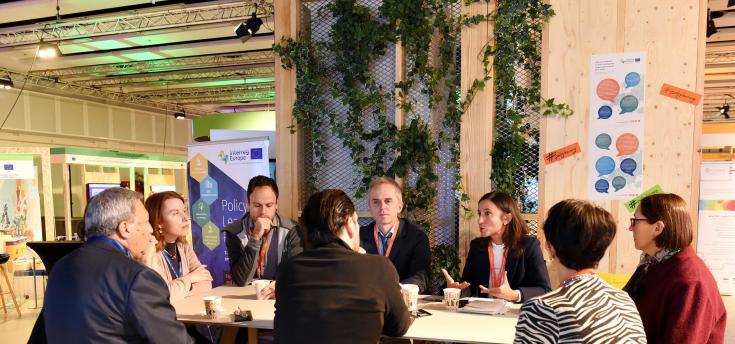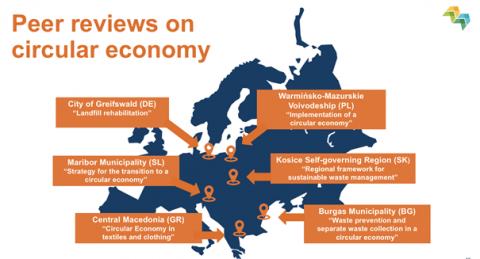Best practices of participative governance at regional level

The Policy Learning Platform received the following policy helpdesk request: 'What are best practices of participative governance at regional level and the role of the policy learning platform?'
Below you will find the response from our low-carbon economy Thematic Expert, Katharina Krell. Are you interested in receiving resources from our team? Submit your expert support request.
Best practices of participative governance at regional level
Individual administrations nowadays 'rarely have all the power, resources and governance structures that are required to adequately respond to public policy challenges under their responsibility and effectively govern their constituencies. This means that they are required to work with, or seek the aid of, others from the public, private, non-government organisation or community spheres, and often across a range of sectors, to achieve their objectives.' (Katherine A. Daniell and Adrian Kay)
Many cities and regions are currently searching for new governance solutions for regional and local circular economy and/or bio-economy initiatives.
The challenge is typically to involve all relevant stakeholders. This goes for the 'internal' stakeholders as for the 'external' ones. Internal are those in the different departments of public administrations, in charge of topics such as environment, energy, waste, economic development, land use, etc., and this at different administrative levels, such as national, regional, and municipal.
External stakeholders are those in the other areas of a quadruple helix: private sector, academia, NGOs and citizens. The better the stakeholder involvement, the broader the new strategy can be carried, and the deeper the local ownership of any planned initiatives. However, it is challenging and potentially lengthy process to set up multi-level multi-stakeholder governance structures, and these should be seen as an investment and a long-term structure.
It is useful to look at other sectors that have already fully deployed multi-stakeholder structures in search for a blue-print that can be transferred to circular bio-economy initiatives, or that could serve at least as inspiration.
In the area of low-carbon economy, we can find several such participatory approaches, especially for strategic energy actions plans (SEAPs).
Multi stakeholder and governance approach for SECAP development and implementation
SEAPs (now being extended to include climate adaptation and labelled SECAPs) are typically municipality-level strategic commitments to sustainable energy combined with quantifiable targets. These are developed in the frame of the Covenant of Mayors, a 'coalition of the willing' that has been initiated by the European Commission in 2008. Many smaller municipalities didn’t have the resources to plan and implement actions on their own, and soon the concept of multi-municipality SEAPs emerged. There are two types of multi-city SEAPs: such where a large metropolitan area is grouping the surrounding municipalities in a joint SEAP, and such where a group of rather equally small municipalities joins forces. This distinction is important and depends on the territorial reality. If a large city is present, it usually has much better resources to lead a joint SEAP and to host the coordination body.
A very good guide to multi level governance for local and regional Public Authorities has been developed by the Coopenergy project co-funded by the Intelligent Energy Europe Programme of the European Union. This guide provides a rational, case studies, a methodology and tips for replication multi-level-governance structures for sustainable energy action plans for interested regions and cities and is an excellent reading.
Among current projects working on multi-level governance structures for SECAPs, the Horizon2020 Pentahelix project is probably the most relevant. Its main objective is to develop an innovative pentahelix based method and use this to engage and support authorities on multiple levels together with other key stakeholders in different sectors for increased SECAP development and implementation.
The public sector is an important driving force in supporting a market transformation to the circular green economy. 'One of the key challenges remains in linking up public bodies at a national, regional and local level through effective multi-level governance to realise an energy transition driven from the local level with concerted planning and implementation of energy projects, as well as in achieving a coherent transformation of the energy system capitalizing on synergies and economies of scale,' as recognised by the Pentahelix partners.
Territorial strategies need to consider not only what actions to prioritise, but also how to organise the different participants and manage institutional arrangements. It is crucial to have a strong co-ordinating entity, able to oversee the whole process, facilitate and prepare meetings, divide responsibilities between municipalities and oversee implementation. The central governance structure should also include a Steering Group made up of both political and technical participants from each of the participating municipalities, with responsibility for co-ordination and overall strategy development and implementation. The actual implementation of tasks, however, should be planned and implemented in working groups, comprised of civil servants, stakeholders, and political representatives and consultants (if external expertise is needed).
Many individual good practices exist, also within the Interreg Europe community with more than 18.000 members. An excellent example is the Sustainable Municipalities good practice from South Ostrobothnia, Finland, where a group of eight municipalities decided to share their problem, joining forces to work together on climate and energy issues with facilitation from the regional energy agency Thermopolis. Beyond the inter-municipality cooperation, another interesting feature is the designation of a team responsible for the topic of energy efficiency in each administration. To ensure that everyone was pulling in the same direction, each municipality set up energy efficiency teams, bringing together staff from different departments. These teams meet regularly to plan and implement energy efficiency actions, including trainings for their co-workers.
In terms of organisations, the Covenant of Mayors team will also provide multiple resources and support its community as well as interested external stakeholders.
Services of the Interreg Europe Policy Learning Platform
This
illustrates nicely the mission, activities and benefits of the Policy Learning Platform.
In terms of multi-stakeholder governance schemes, what could be the role of the Policy Learning Platform?
- Events for the community in the area of multi-stakeholder governance
In response to project demand, the Interreg Europe Policy Learning Platform arranged an online discussion with partners from the APPROVE, COALESCCE, INTENSIFY, SUPPORT and ZEROCO2 projects on 10 July 2019 to discuss challenges related to governing multi-municipal low-carbon strategies. Read about the outcomes here.
- On-demand policy support services in the area of multi-stakeholder governance
The PLP can provide collections of good practices related to a certain topic upon demand in form of a policy helpdesk request, see here.
If an organisation is interested in a specific topic and wants to hear in detail about approaches to this topic experienced by two or three other organisations, a short request can be sent to the PLP for a matchmaking. Upon which the platform will seek the relevant people, invite them and brief them and prepare, organize and moderate a 90-min online exchange called 'matchmaking'. Read more here.
The most comprehensive on-demand service is the peer review service, which provides truly individual advice. The objective of the peer review is to enable policymakers to receive hands-on feedback and advice from peers on a selected policy challenge to tackle, for instance how to design a new bio-waste policy in line with the new EU regulations.
Peer reviews are offered to local and regional public authorities from all European regions free of charge. The Policy Learning Platform identifies suitable experts (peers) from other regions who can support the host region in finding solutions to its policy challenges. The peer review process involves an intensive 2-day peer-to-peer meeting that is normally conducted in the host region seeking advice. Since the beginning of the ongoing public health emergency, peer reviews are being successfully carried out on-line.
In the area of multi-stakeholder governance, this has happened for example in May 2019, when a peer review was organised in Eupen for Belgium's German speaking community with a focus on practical approaches and challenges in coordinating and implementing a multi-municipality SECAP and in supporting the local authorities regarding energy-related measures. The community aimed to improve its management strategy with regard to measure implementation, reporting and overall coordination together with local stakeholders, to reach its ambitious climate goals for 2030. Read more here.
Indeed, circular economy topics are currently high in demand of our peer review services, as the map below indicates:

